中考一般将来时的讲解,专项练习及答案.doc知识讲解
专项练习 初中英语重点一般将来时讲解与练习(含答案)

初中英语:一般将来时专项练习题1.What good news! Xiaogan West Station in Yunmeng in two years. A.buildsB.will buildC.is builtD.will be built【答案】D【解析】【详解】句意:多好的消息啊!孝感西站将于两年内在云梦建成。
A. builds 动词三单,建造;B. will build一般将来时态,将要建造;C. is built 一般现在时态的被动语态,被建造;D. will be built一般将来时态的被动语态,将被建造。
根据in two years表示将来的时间短语,以及主谓之间的被动关系,所以本句使用“一般将来时态的被动语态”。
故选D。
2.--These plans are all suitable.I haven't decided which one to choose. --It's OK.You ________ plenty of time to make a decision.A.gave B.giveC.will give D.will be given【答案】D【解析】【详解】试题分析:句意:―这些计划都合适。
我没有决定选择哪一个。
―好,会给你充足的时间作决定。
现在还没有决定,将会给时间,用一般将来时态。
“给你充足的时间”,主语you是谓语动词give的承受者,句子用被动语态,故选D。
【考点定位】考查动词的时态及语态辨析。
3.--You know what? The graduation party ______ in our school hall on June 14th.-- Great! I’m looking forward to it!A.holds B.is held C.was held D.will be held 【答案】D【解析】【详解】句意:——你知道吗?毕业联欢会将于6月14日在我们学校的礼堂举行。
初中英语主要时态系列——一般将来时讲解及练习【附中考真题及解析】
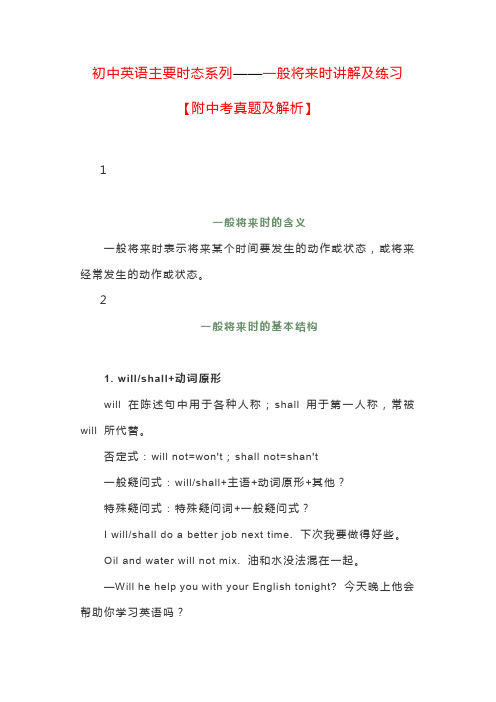
初中英语主要时态系列——一般将来时讲解及练习【附中考真题及解析】1一般将来时的含义一般将来时表示将来某个时间要发生的动作或状态,或将来经常发生的动作或状态。
2一般将来时的基本结构1. will/shall+动词原形will 在陈述句中用于各种人称;shall用于第一人称,常被will 所代替。
否定式:will not=won't;shall not=shan't一般疑问式:will/shall+主语+动词原形+其他?特殊疑问式:特殊疑问词+一般疑问式?I will/shall do a better job next time. 下次我要做得好些。
Oil and water will not mix. 油和水没法混在一起。
—Will he help you with your English tonight? 今天晚上他会帮助你学习英语吗?—Yes, he will./No, he won't. 是的,他会。
/不,他不会。
—When will you arrive for America? 你什么时候去美国?—Tomorrow. 明天。
2. am/is/are going to +动词原形否定式:am/is/are not going to +动词原形一般疑问式:am/is/are +主语+ going to + 动词原形+其他?特殊疑问式:特殊疑问词+一般疑问式?He is going to spend his holidays in London. 他打算在伦敦度假。
Look at the dark clouds. There is going to be a storm. 看那乌云,快要下雨了。
Is he going to collect any data for us? 他会帮我们收集数据吗?What are you going to do tomorrow? 明天你打算作什么?3一般将来时的用法will+动词原形与am/is/are going to +动词原形的用法虽然都表示将来发生动作或情况,一般情况下能互换。
完整word版,初中一般将来时讲解练习及答案
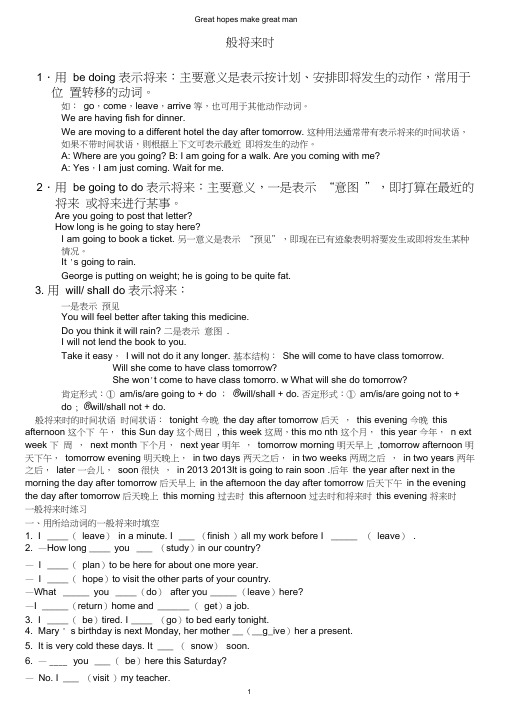
般将来时1.用be doing 表示将来:主要意义是表示按计划、安排即将发生的动作,常用于位置转移的动词。
如:go,come,leave,arrive 等,也可用于其他动作动词。
We are having fish for dinner.We are moving to a different hotel the day after tomorrow. 这种用法通常带有表示将来的时间状语,如果不带时间状语,则根据上下文可表示最近即将发生的动作。
A: Where are you going? B: I am going for a walk. Are you coming with me?A: Yes,I am just coming. Wait for me.2.用be going to do 表示将来:主要意义,一是表示“意图”,即打算在最近的将来或将来进行某事。
Are you going to post that letter?How long is he going to stay here?I am going to book a ticket. 另一意义是表示“预见”,即现在已有迹象表明将要发生或即将发生某种情况。
It 's going to rain.George is putting on weight; he is going to be quite fat.3. 用will/ shall do 表示将来:一是表示预见You will feel better after taking this medicine.Do you think it will rain? 二是表示意图.I will not lend the book to you.Take it easy,I will not do it any longer. 基本结构:She will come to have class tomorrow.Will she come to have class tomorrow?She won't come to have class tomorro. w What will she do tomorrow?肯定形式:① am/is/are going to + do ;®will/shall + do. 否定形式:① am/is/are going not to +do ; ®will/shall not + do.般将来时的时间状语时间状语:tonight 今晚the day after tomorrow 后天,this evening 今晚this afternoon 这个下午,this Sun day 这个周日, this week 这周,this mo nth 这个月,this year 今年,n ext week 下周,next month 下个月,next year 明年,tomorrow morning 明天早上,tomorrow afternoon 明天下午,tomorrow evening 明天晚上,in two days 两天之后,in two weeks 两周之后,in two years 两年之后,later 一会儿,soon 很快,in 2013 2013It is going to rain soon .后年the year after next in the morning the day after tomorrow 后天早上in the afternoon the day after tomorrow 后天下午in the evening the day after tomorrow 后天晚上this morning 过去时this afternoon 过去时和将来时this evening 将来时一般将来时练习一、用所给动词的一般将来时填空1. I ____ (leave)in a minute. I ___ (finish )all my work before I _____ (leave).2. —How long ____ you ___ (study)in our country?—I ____ (plan)to be here for about one more year.—I ____ (hope)to visit the other parts of your country.—What _____ you ____ (do)after you _____ (leave)here?—I _____ (return)home and ______ (get)a job.3. I ____ (be)tired. I ____ (go)to bed early tonight.4. Mary ' s birthday is next Monday, her mother __(__g_ive)her a present.5. It is very cold these days. It ___ (snow)soon.6. —____ you ___ (be)here this Saturday?—No. I ___ (visit )my teacher.7. —____ I ______ (get)you a copy of today ' s newspaper?—Thank you.8. I am afraid there _____ (be)a meeting this afternoon. I can .' t join you9. Mike _____ (believe, not)this until he _____ (see)it with his own eyes.10. Most of us don 't think their team _(__w_i_n_).二、单项选择1. There ________ a meeting tomorrow afternoon.A. will be going toB. will going to beC. is going to beD. will go to be2. Charlie _______ here next month.A. isn ' t workingB. doesn ' t workingC. isn ' t going to workingD. won ' t work3. He ______ very busy this week, he _______ free next week.A. will be; isB. is; isC. will be; will beD. is; will be4. There _______ a dolphin show in the zoo tomorrow evening.A. wasB. is going to haveC. will haveD. is going to be5. - _______ you ________ free tomorrow?-No. I _________ free the day after tomorrow.A. Are; going to; willB. Are; going to be; willC. Are; going to; will beD. Are; going to be; will be6. Mother _______ me a nice present on my next birthday.A. will givesB. will giveC. givesD. give7. -Shall I buy a cup of tea for you?- ________ . (不,不要。
(完整版word)英语一般将来时形式讲解及答案解析
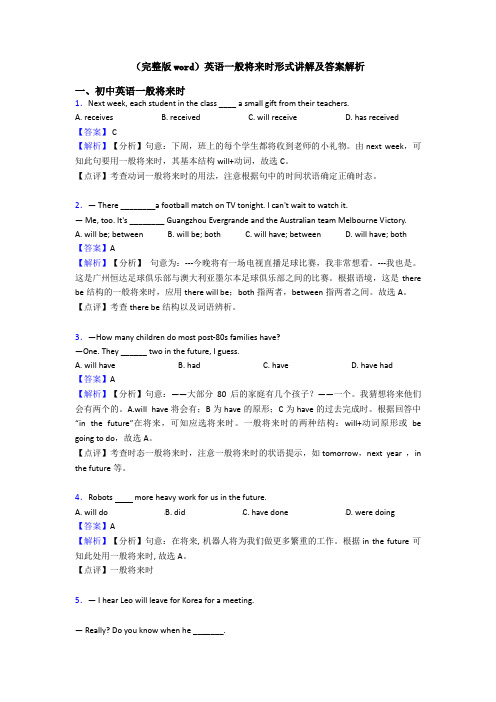
(完整版word)英语一般将来时形式讲解及答案解析一、初中英语一般将来时1.Next week, each student in the class ____ a small gift from their teachers.A. receivesB. receivedC. will receiveD. has received【答案】 C【解析】【分析】句意:下周,班上的每个学生都将收到老师的小礼物。
由next week,可知此句要用一般将来时,其基本结构will+动词,故选C。
【点评】考查动词一般将来时的用法,注意根据句中的时间状语确定正确时态。
2.— There ________a football match on TV tonight. I can't wait to watch it.— Me, too. It's ________ Guangzhou Evergrande and the Australian team Melbourne Victory.A. will be; betweenB. will be; bothC. will have; betweenD. will have; both【答案】A【解析】【分析】句意为:---今晚将有一场电视直播足球比赛,我非常想看。
---我也是。
这是广州恒达足球俱乐部与澳大利亚墨尔本足球俱乐部之间的比赛。
根据语境,这是there be结构的一般将来时,应用there will be;both指两者,between指两者之间。
故选A。
【点评】考查there be结构以及词语辨析。
3.—How many children do most post-80s families have?—One. They ______ two in the future, I guess.A. will haveB. hadC. haveD. have had【答案】A【解析】【分析】句意:——大部分80后的家庭有几个孩子?——一个。
最新一般将来时中考经典题型带答案(word)

最新一般将来时中考经典题型带答案(word)一、一般将来时1.Jack ______ a good rest as soon as he finishes the exam.A. hasB. hadC. is havingD. will have【答案】 D【解析】【分析】句意:Jack一完成他的考试就要好好的休息一下。
has第三人称单数形式;had是have的过去式;is having现在进行时态;will have一般将来时态。
have a rest是固定短语,意思是“休息一下”,句中的as soon as引导的是时间状语从句,从句中用一般现在时态,主句用一般将来时态,故答案选D。
【点评】考查一般将来时态。
2.Michael _________ in a school in Yunnan from February to June next year.A. teachB. taughtC. will teachD. was teaching【答案】C【解析】【分析】句意:Michael将会在明年2月到6月在云南的学校教学。
A动词原形;B一般过去时;C是一般将来时;D是过去进行时。
Next year是一般将来时的时间状语,will+动词原形,故答案为C。
【点评】考查动词的时态,注意句中的时间状语。
3.Look on the bright side of life,and imagine that you ______ a happy and successful future.A. hadB. will haveC. haveD. have had【答案】 B【解析】【分析】考查时态.句意"看看生活中美好的一面,想象你会有一个幸福和成功的未来.".A过去时.B一般将来时态.C动词原形.D现在完成时态.结合语境"看看生活中美好的一面,想象你___一个幸福和成功的未来.",由future未来,可知,表示将来,用一般将来时态.答案是B.4.—Excuse me,could you please tell me if the meeting ________ on time?—If it ________ tomorrow,we'll have to put it off.A. will hold; snowsB. will be held; snowsC. will be held; snowD. holds; will snow 【答案】B【解析】【分析】句意:—打扰了,请你告诉我会议是否准时举行好吗?—如果明天下雪,我们只好推迟了。
一般将来时讲解(附习题+答案)

一般将来时讲解(附习题+答案)一、一般将来时的含义:表示动作发生在将来二、一般将来时的句型:(1) will/shall+动词原形(2) be going to+动词原形三、一般将来时的时间状语:tomorrow(明天)、the day after tomorrow(后天)、next...(下一...): next week(下一周)、next year(明年)、next month(下个月)in+一段时间(...之后): in three days(三天之后)、in the future在未来this evening(今天晚上)四、一般将来时的句型结构:(1) will/shall+动词原形(will not =won’t)(will 各种人称均可用,shall 只能用于第一人称)1)肯定句:主语+will/shall+动词原型...如:I will go to school tomorrow.我明天将会去学校He will go to school tomorrow.他明天将会去学校。
2)否定句:主语+will/shall+not+动词原型...如:I won’t go to school tomorrow.我明天将不会去学校。
He won’t go to school tomorrow.他明天将不会去学校。
3)一般疑问句:Will/Shall +主语+动词原型...如:Will you go to school tomorrow?你明天要去学校吗?Will he go to school tomorrow?他明天要去学校吗?肯定回答:Yes, 主语+will.如:Yes, I will.Yes, he will.否定回答:No,主语+will+not.如:No, I won’t.No, he won’t.4) 特殊疑问句:特殊疑问词+will/shall+主语+动词原型...如:What will you do tomorrow?你明天将会做什么?What will he do tomorrow?他明天将会做什么?(2) be going to+动词原形1)肯定句:主语+be going to +动词原型...如:I am going to buy some books tomorrow.我明天打算去买一些书。
中考中考英语总复习 一般将来时考点解析(Word版附答案)

中考中考英语总复习一般将来时考点解析(Word版附答案)一、初中英语一般将来时1.—How many children do most post-80s families have?—One. They ______ two in the future, I guess.A. will haveB. hadC. haveD. have had【答案】A【解析】【分析】句意:——大部分80后的家庭有几个孩子?——一个。
我猜想将来他们会有两个的。
A.will have将会有;B为have的原形;C为have的过去完成时。
根据回答中“in the future”在将来,可知应选将来时。
一般将来时的两种结构:will+动词原形或be going to do,故选A。
【点评】考查时态一般将来时,注意一般将来时的状语提示,如tomorrow,next year ,in the future等。
2.—Do you know when Mrs. White for dinner this evening?—No, but I think she when she is free.A. will come; will comeB. will come; comesC. comes; will come【答案】 A【解析】【分析】句意:——你知道怀特太太今晚是否来吃晚饭吗?——不知道。
但我认为如果她有空,她会来。
空一,句子为含有宾语从句的主从复合句,主句是一般现在时,从句用它所需要的任何时态,根据this evening今晚,可知句子为一般将来时,will come;空二,回答是when引导的时间状语从句,从句是一般现在时,主句应用将来时,will come,故选A。
【点评】此题考查从句的时态。
3.—Excuse me,could you please tell me if the meeting ________ on time?—If it ________ tomorrow,we'll have to put it off.A. will hold; snowsB. will be held; snowsC. will be held; snowD. holds; will snow 【答案】B【解析】【分析】句意:—打扰了,请你告诉我会议是否准时举行好吗?—如果明天下雪,我们只好推迟了。
初中一般将来时讲义【含答案】
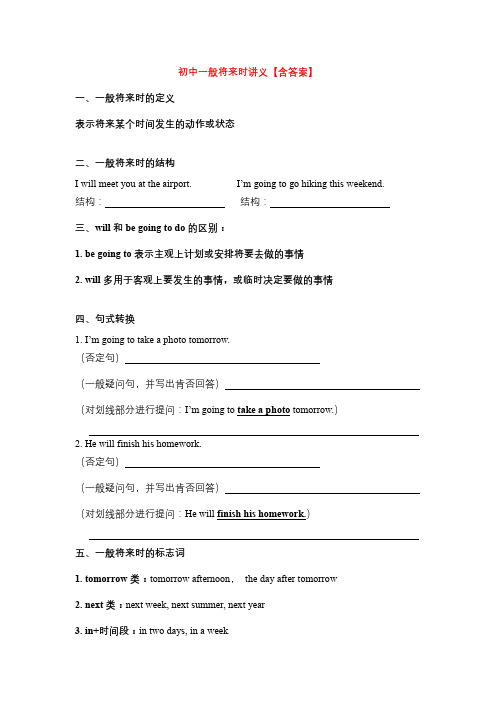
初中一般将来时讲义【含答案】一、一般将来时的定义表示将来某个时间发生的动作或状态二、一般将来时的结构I will meet you at the airport. I’m going to go hiking this weekend.结构:结构:三、will和be going to do的区别:1. be going to表示主观上计划或安排将要去做的事情2. will多用于客观上要发生的事情,或临时决定要做的事情四、句式转换1. I’m going to take a photo tomorrow.(否定句)(一般疑问句,并写出肯否回答)(对划线部分进行提问:I’m going to take a photo tomorrow.)2. He will finish his homework.(否定句)(一般疑问句,并写出肯否回答)(对划线部分进行提问:He will finish his homework.)五、一般将来时的标志词1. tomorrow类:tomorrow afternoon,the day after tomorrow2. next类:next week, next summer, next year3. in+时间段:in two days, in a week4.其他:in the future, one day, someday【课堂练习】1. We don’t know when __________ next week. Please call me when he arrives.A. will he arriveB. does he arriveC. he will arriveD. he arrives2. —How soon will he come back to Guangzhou?—I have no idea. Maybe he __________ in one or two days.A. will comeB. comesC. comeD. came3. ---will the train arrive?---It the station in 50 minutes.A. How soon; will get toB. How soon; arriveC. How long; will reachD. How far; gets to4. Will you at the bus stop at 10:30?A. meetingB. meetsC. meetD. met5. Lily and I to the concert it we free next week.A. go; areB. go; will beC. will go; will beD. will go; are初中一般将来时讲义(答案)一、一般将来时的定义表示将来某个时间发生的动作或状态二、一般将来时的结构I will meet you at the airport. I’m going to go hiking this weekend.结构:will+动词原形结构:am/is/are going to+动词原形三、will和be going to do的区别:1. be going to表示主观上计划或安排将要去做的事情2. will多用于客观上要发生的事情,或临时决定要做的事情四、句式转换1. I’m going to take a photo tomorrow.(否定句)I’m not going to take a photo tomorrow.(一般疑问句,并写出肯否回答)---Are you going to take a photo tomorrow?---Yes, I am. / No, I’m not.(对划线部分进行提问:I’m going to take a photo tomorrow.)What are you going to do tomorrow?2. He will finish his homework.(否定句)He will not finish his homework.(一般疑问句,并写出肯否回答)---Will he finish his homework?---Yes, he will. /No, he won’t.(对划线部分进行提问:He will finish his homework.)What will he do?五、一般将来时的标志词1. tomorrow类:tomorrow afternoon,the day after tomorrow2. next类:next week, next summer, next year3. in+时间段:in two days, in a week4.其他:in the future, one day, someday【课堂练习】1. We don’t know when __________ next week. Please call me when he arrives.A. will he arriveB. does he arriveC. he will arriveD. he arrives2. —How soon will he come back to Guangzhou?—I have no idea. Maybe he __________ in one or two days.A. will comeB. comesC. comeD. came3. ---will the train arrive?---It the station in 50 minutes.A. How soon; will get toB. How soon; arriveC. How long; will reachD. How far; gets to4. Will you at the bus stop at 10:30?A. meetingB. meetsC. meetD. met5. Lily and I to the concert it we free next week.A. go; areB. go; will beC. will go; will beD. will go; are。
中考一般将来时态讲解及习题和答案

中考一般将来时态讲解及习题和答案中考一般将来时态专题一.概念以及构成表示将来某个时间将要发生的动作或存在的状态,也表示将来经常或反复发生的动作,经常与表示将来的时间状语连用。
基本构成will+V/shall+V二.它的标志性时间状语1.含tomorrow; next短语;2.in+段时间;3.how soon;4.by+将来时间;5.by the time sb.do…6.祈使句句型中:or/and sb. will do7.在时间/条件状语从句中, 如果从句用一般现在时, 主句用将来时8.another day三.如何比较be going to 与will的使用:①be going to 表示近期、眼下就要发生的事情,will 表示的将来时间则较远一些。
e.g: He is going to write a letter tonight.He will write a book one day.②be going to 表示根据主观判断将来肯定发生的事情,will表示客观上将来势必发生的事情。
e.g:He is seriously ill. He is going to die.He will be twenty years old.③be going to 含有“计划,准备”的意思,而will 则没有这个意思,e.g:She is going to lend us her book. He will be here in half an hour.④在有条件从句的主句中,不用be going to, 而用will,e.g: If any beasts come at you, I'll stay with you and help you.四.主将从现详讲定义:if 引导的条件状语从句中,主句用将来时态,从句用现在时态。
If是连词,所连接的句子叫条件状语从句,表示假设或条件,意思是“ 如果…的话” 。
(完整word版)一般将来时态讲解及练习和答案

1、概述一般将来时表示将来某个时间要发生的动作或存在的状态,常与表示将来的时间状语连用,如tomorrow,next week,next year等。
Why don’t you put the meat in the fridge? It will stay fresh for several days.为什么不把肉放在冰箱里?它可以保鲜好几天。
—You’ve left the light on。
你忘了关灯了。
- Oh , so I have。
I'll go and turn it off。
噢,那我马上去关.2、构成一般将来时由“助动词will/shall+动词原形”构成。
will用于第二、三人称,shall第一人称。
在口语中,will在名词或代词后常缩写为’ll,will not简缩为won’t[wount]。
但在美国英语中,各种人称皆可用will。
He will help his sister with her lessons。
他将帮助他妹妹做功课.We won’t be free this afternoon.今天下午我们没空。
3、一般将来时的用法(1)表示未来的动作或存在状态,常与表示将来的时间状语连用,如tomorrow, next Sunday, soon,in a month, in the future等。
We shall leave for London next Monday.我们将在下周一去伦敦。
He will come to see you the day after tomorrow.后天他要来看你。
You will be 20 next year。
明年你就二十了。
(2)表示将来反复发生的动作或习惯性动作We shall come and work in this factory every year.我们将每年来这工厂参加劳动。
The students will have five English classes per week this term.本学期学生每周将要上五节英语课。
中考英语专题讲练一般将来时(解析版)

中考英语专题讲练一般将来时(解析版)一般将来时知识精讲一、一般将来时表示将来某一时刻的动作或状态,或将来某一段时间内经常的动作或状态。
二、句子结构主语+will/ shall + do/be (动词原形)主语+ be (is/am/are) going to do/be (动词原形)三、基本用法四、时间状语1. tomorrow, the day after tomorrow 明天,后天2. next week/ month/ year 下周/月/年3. in +时间段(对其提问用how soon):in two days 两天后4. in +过去时间点:in 2020在2020年5. soon 不久以后6. in (the) future 将来、未来五、相关句式三点剖析一、考点:一般将来时的基本用法,以及常用的时间状语。
注意will 和be going to do 的用法区别。
二、易错点:表将来时的其它形式:1. 现在进行时表将来下列动词的现在进行时表示将来时:go, come, fly, leave, start, begin, finish, end, arrive.例:She is leaving for Shanghai tomorrow. 她明天将会到达上海。
The bus is coming. 公交车要来了。
2. 一般现在时表将来1). 下列动词的一般现在时可以表示将来:come, go, arrive, leave, start, begin,return,主要用来表示在时间上已确定或安排好的事情。
例:The train leaves at six tomorrow morning. 火车明天上午六点开。
When does the bus star? It stars in ten minutes. 汽车什么时候开?十分钟后。
2). if 引导的条件状语从句,主句用一般将来时,从句用一般现在时表将来。
中考英语专题讲练:一般将来时(含解析)(最新整理)
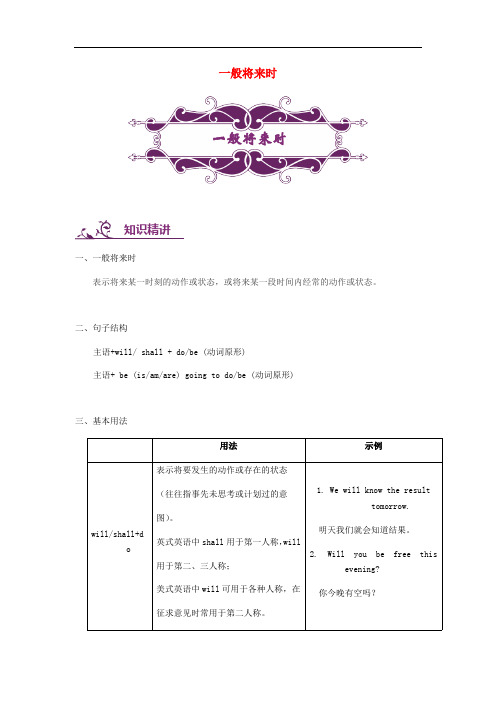
一般将来时一、一般将来时表示将来某一时刻的动作或状态,或将来某一段时间内经常的动作或状态。
二、句子结构主语+will/ shall + do/be (动词原形)主语+ be (is/am/are) going to do/be (动词原形)三、基本用法用法示例will/shall+do 表示将要发生的动作或存在的状态(往往指事先未思考或计划过的意图)。
英式英语中shall用于第一人称,will用于第二、三人称;美式英语中will可用于各种人称,在征求意见时常用于第二人称。
1. We will know the resulttomorrow.明天我们就会知道结果。
2. Will you be free thisevening?你今晚有空吗?一般将来时知识精讲be going to do 表示计划、打算去做某事(往往指当前计划过或思考过的意图或打算);还可以表示客观迹象表明必将要发生某事。
1. I’m going to quit my presentjob.我打算辞掉现在的工作。
2. Look at the black clouds inthe sky. It’s going torain.看天空的黑云。
要下雨了。
四、时间状语1. tomorrow, the day after tomorrow 明天,后天2. next week/ month/ year 下周/月/年3. in +时间段(对其提问用how soon):in two days 两天后4. in +过去时间点:in 2020在2020年5. soon 不久以后6. in (the) future 将来、未来五、相关句式will do be going to do 肯定式主语+ will do…主语+ be going to do…否定式主语+ will + not + do…主语+ be + not + going to do…疑问式Will +主语+do…?Be+主语+ going to do …?一、考点:一般将来时的基本用法,以及常用的时间状语。
中考一般将来时态讲解及习题和答案
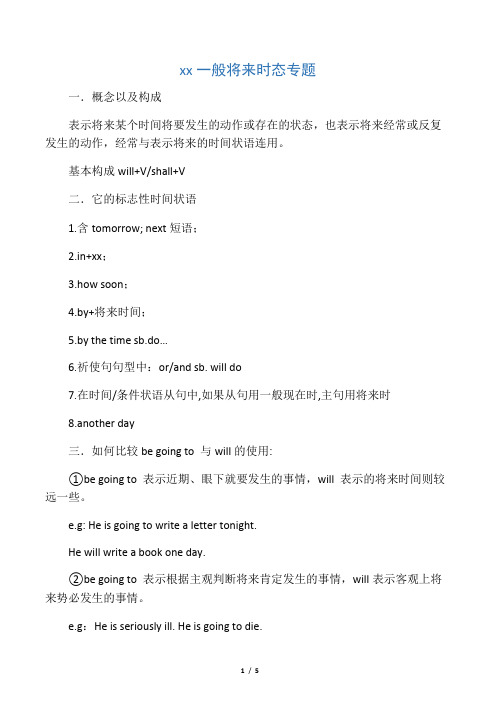
xx一般将来时态专题一.概念以及构成表示将来某个时间将要发生的动作或存在的状态,也表示将来经常或反复发生的动作,经常与表示将来的时间状语连用。
基本构成will+V/shall+V二.它的标志性时间状语1.含tomorrow; next短语;2.in+xx;3.how soon;4.by+将来时间;5.by the time sb.do…6.祈使句句型中:or/and sb. will do7.在时间/条件状语从句中,如果从句用一般现在时,主句用将来时8.another day三.如何比较be going to 与will的使用:①be going to 表示近期、眼下就要发生的事情,will 表示的将来时间则较远一些。
e.g: He is going to write a letter tonight.He will write a book one day.②be going to 表示根据主观判断将来肯定发生的事情,will表示客观上将来势必发生的事情。
e.g:He is seriously ill. He is going to die.He will be twenty years old.③be going to 含有“计划,准备”的意思,而will 则没有这个意思,e.g:She is going to lend us her book.He will be here in half an hour.④在有条件从句的主句中,不用be going to,而用will,e.g:If any beasts come at you, I'll stay with you and help you.四.主将从现详讲定义:if 引导的条件状语从句中,主句用将来时态,从句用现在时态。
If 是连词,所连接的句子叫条件状语从句,表示假设或条件,意思是“如果…的话”。
常见的主将从现连接词:if,as soon as, unlesse.g: I’ll go with you as soon as I finish my work.①表示假设,表示将会发生和可能发生的事,或进行提醒警告。
- 1、下载文档前请自行甄别文档内容的完整性,平台不提供额外的编辑、内容补充、找答案等附加服务。
- 2、"仅部分预览"的文档,不可在线预览部分如存在完整性等问题,可反馈申请退款(可完整预览的文档不适用该条件!)。
- 3、如文档侵犯您的权益,请联系客服反馈,我们会尽快为您处理(人工客服工作时间:9:00-18:30)。
中考一般将来时的讲解,专项练习及答案.d o c一、一般将来时的动词形式一般将来时表示将来某个时间将要发生的动作或存在的状态,也表示将来经常或反复发生的动作。
一般将来时由助动词shall或will加动词原形构成,shall用于第一人称,will用于第二、三人称。
但是现在第一人称一般也用will,其区别并不明显。
(或“be going to +动词原形)常与tomorrow, next… , in(the)future,soon, in five days,in two weeks等连用。
如: I shall not come if it rains tomorrow.如明天下雨我就不来。
My father will leave for China next week.我的爸爸下星期要到中国去。
“I’ll, You’ll, He’ll , She’ll , It’ll, We’ll , They’ll …”是简缩形式。
二.一般将来时的句型1.肯定句:主语+shall /will+动词+其他成份The workers will build a new school here next year.工人们明年将在这儿盖一所新学校。
They will go shopping this afternoon.今天下午他们将要去购物。
We shall have a delicious dinner tonight.今晚我们将美餐一顿。
We shall be there before dark.我们天黑前会到达那里。
2.否定句:主语+shall /will+not+动词+其他成份She won’t come back this week.这一周她不回来了。
I will not go shopping one hour later.一小时之后我不会去购物。
He won’t play football with you before he finishes his work.他干完活后才能跟你踢足球。
3.疑问句:shall /will+主语+动词+其他成份Will you be back in ten minutes?十分钟后你会回来吗?Will you please open the window?请你打开窗户好吗?Shall we get something hot to drink?我们喝一些热饮怎么样?4.特殊疑问句:特殊疑问词+shall /will+主语+动词+其他成份Where will you go next week?下星期你去哪? What shall I do?我怎么办呢一般将来时专项练习一、单项选择。
( ) 1. There __________ a meeting tomorrow afternoon.A. will be going toB. will going tobeC. is going to beD. will go to be( ) 2. Charlie ________ here next month.A. isn’t workingB. doesn’t workingC. isn’t going to workingD. won’t work( ) 3. He _____ very busy this week, he _____free nextweek.A. will be; isB. is; isC. will be; will beD. is; willbe( ) 4. There ________ a dolphin show in the zoo tomorrow A. was B. is going to haveC. will haveD. is going to be’( ) 5. –________ you ________ free tomorrow?– No. I ________ free the day after tomorrow.A. Are; going to; willB. Are; going to be; willC. Are; going to; will beD. Are; going to be; willbe( ) 6. Mother ____ me a nice present on my next birthday.A. will givesB. will giveC. givesD.give( ) 7. – Shall I buy a cup of tea for you?–________.(不,不要。
)A. No, you won’t.B. No, you aren’t.C. No, please don’t.D. No, please.( ) 8. – Where is the morning paper?– I ________ if for you at once.A. getB. am gettingC. to getD. willget( ) 9. ________ a concert next Saturday?A. There will beB. Will therebeC. There can beD. There are( ) 10. If they come, we ________ a meeting.A. haveB. will haveC. hadD. wouldhave( ) 11. He ________ her a beautiful hat on her next birthday.A. givesB. gaveC.will givingD. is going togive( ) 12. He ________ to us as soon as he gets there.A. writesB. has writtenC. will writeD. wrote( ) 13. He ________ in three days.A. coming backB. came backC. will come backD. is going to coming back ( ) 14. If it ________ tomorrow, we’ll go roller-skating.A. isn’t rainB. won’t rainC. doesn’t rainD. doesn’t fine( ) 15. – Will his parents go to see the film tomorrow?– No, ________(不去).A. they willn’t.B. they won’t.C. they aren’t.D. they don’t.( ) 16. Who ____you_____ swimming with tomorrow afternoon?A. will; goB. do; goC. will; goingD. shall; go ( ) 17. We ________ the work this way next time.A. doB. will doC. going to doD. will doing( ) 18. Tomorrow he ________ a kite in the open air first, and then ________ boating in the park.A. will fly; will goB. will fly; goesC. is going to fly; will goesD. flies; will go( ) 19. The day after tomorrow they ____ a volleyball match.A. will watchingB. watchesC. is watchingD. is going to watch( ) 20. There ________ a birthday party this Sunday.A. shall beB. will beC. shall going to beD. will going to be( ) 21. They ________ an English evening next Sunday.A. are havingB. are going to haveC. will havingD. is going to have( ) 22. ________ you ________ free next Sunday?A. Will; areB. Will; beC. Do; beD. Are; be ( ) 23. He ________ there at ten tomorrow morning.A. willB. IsC. will beD. be( ) 24. _____ your brother _______ a magazine from the library?A. Are; going to borrowB. Is; going to borrowC. Will; borrowsD. Are; going to borrows ( ) 25– Shall I come again tomorrow afternoon?–___(好的).A. Yes, pleaseB. Yes, you will.C. No, please.D. No, you won’t.( ) 26. It ________ the year of the horse next year.A. is going to beB. is going toC. will beD. will is( ) 27. ________ open the window?A. Will you pleaseB. Please will youC. You pleaseD. Do you( ) 28. –Let’s go out to play football, shall we?– OK. I ________.A. will comingB. be going to comeC. comeD. am coming( ) 29. It ________ us a long time to learn English well.A. takesB. will takeC. spendsD. will spend ( ) 30. The train ________ at 11.A. going to arriveB. will be arriveC. is going toD. is arriving二、动词填空。
